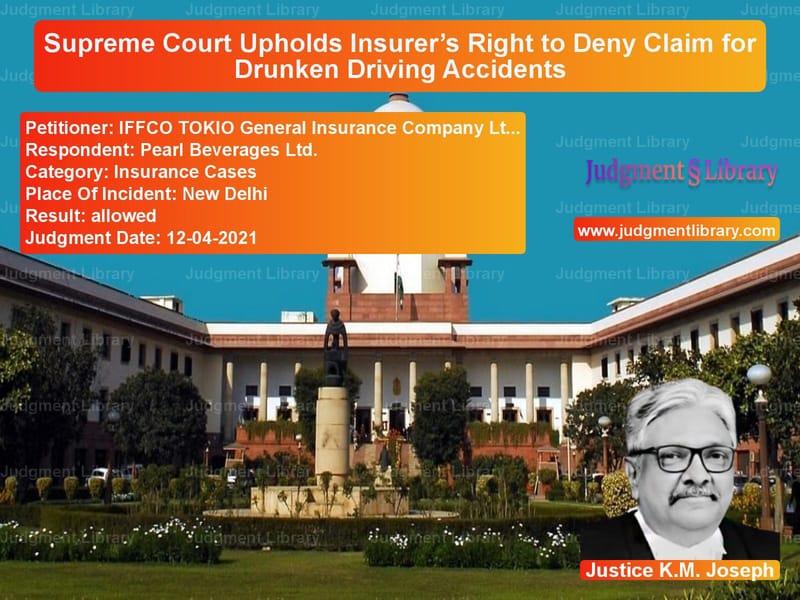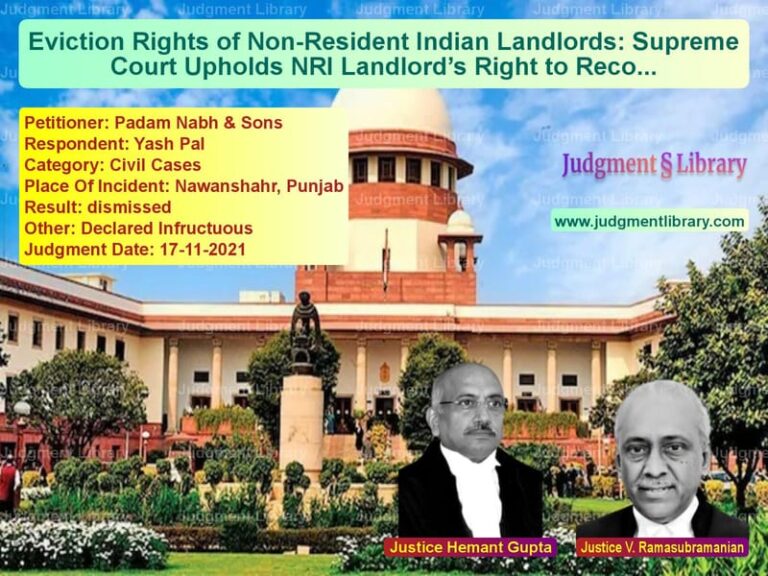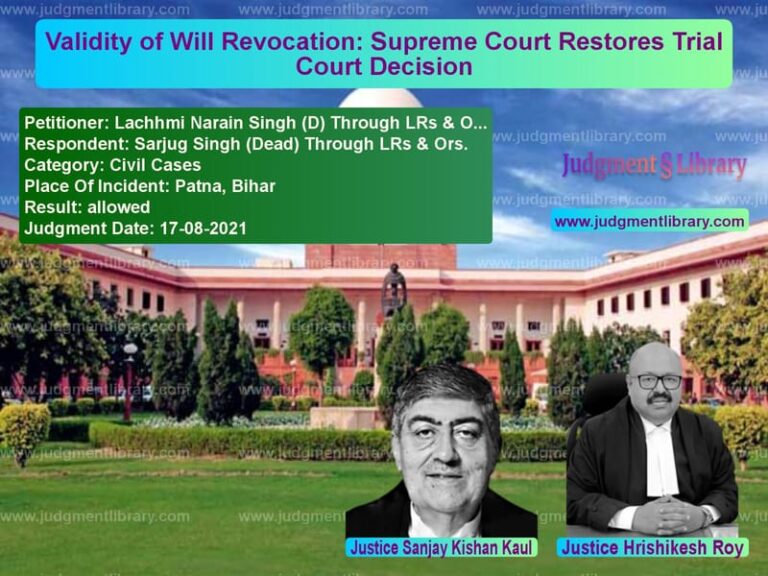Supreme Court Upholds Insurer’s Right to Deny Claim for Drunken Driving Accidents
The Supreme Court of India recently delivered a crucial judgment in IFFCO TOKIO General Insurance Company Ltd. v. Pearl Beverages Ltd., addressing the issue of insurance claims in cases where the driver was under the influence of alcohol. The Court ruled in favor of the insurer, reinforcing that a policy exclusion clause barring claims when the driver is intoxicated is legally enforceable.
Background of the Case
The case arose from an accident on November 22, 2007, involving a Porsche belonging to Pearl Beverages Ltd., which was insured with IFFCO TOKIO General Insurance Company Ltd. The car was completely damaged in the accident, and the insurance company repudiated the claim on the grounds that the driver was under the influence of alcohol, citing an exclusion clause in the insurance policy.
Initially, the State Consumer Commission ruled in favor of the insurer, agreeing that the driver had consumed alcohol. However, the National Consumer Disputes Redressal Commission (NCDRC) overturned this ruling, stating that there was no clear evidence proving that the driver was ‘under the influence of alcohol’ to a legally significant extent.
This prompted IFFCO TOKIO to appeal to the Supreme Court, leading to the present judgment.
Petitioner’s Arguments (IFFCO TOKIO General Insurance Company Ltd.)
- The insurance policy contained a specific exclusion clause stating that no claim would be payable if the person driving the vehicle was ‘under the influence of intoxicating liquor or drugs’ at the time of the accident.
- There was sufficient evidence from the First Information Report (FIR) and the Medico-Legal Certificate (MLC) confirming that the driver, Aman Bangia, smelled of alcohol at the time of the accident.
- The accident was severe, with the car hitting a footpath, an electric pole, and a wall before overturning and catching fire, indicating reckless driving likely influenced by alcohol consumption.
- The driver had pleaded guilty under Section 279 of the Indian Penal Code (rash and negligent driving), which was evidence of reckless behavior.
- The NCDRC erred in requiring a breath or blood alcohol test, as proving that a driver was under the influence of alcohol does not mandate a specific test under contract law.
Respondent’s Arguments (Pearl Beverages Ltd.)
- The NCDRC was correct in ruling that merely smelling of alcohol is not sufficient to establish that the driver was ‘under the influence’ to the extent required to deny the insurance claim.
- There was no breathalyzer or blood alcohol test conducted, so the insurance company failed to prove the exact level of intoxication.
- Under Section 185 of the Motor Vehicles Act, a driver is only legally intoxicated if alcohol levels exceed 30 mg per 100 ml of blood. Since no such test was performed, there was no legal basis to conclude that the driver was intoxicated beyond the permissible limit.
- The State Commission wrongly applied the principle of ‘res ipsa loquitur’ (the thing speaks for itself) to conclude that the accident was caused by intoxication.
- The insurance company’s own investigator did not take any steps to confirm the alcohol levels of the driver, despite having an opportunity to do so.
Supreme Court’s Analysis and Judgment
The Supreme Court examined the exclusion clause in the insurance contract, legal precedents, and scientific evidence related to alcohol consumption and its effects on driving.
Key observations of the Court:
- “The mere fact that no breathalyzer test or blood alcohol test was conducted does not prevent the insurer from proving that the driver was under the influence of alcohol.”
- “The FIR and the MLC both indicate that the driver smelled of alcohol, which, when coupled with the circumstances of the accident, strongly suggests that alcohol consumption played a role.”
- “The exclusion clause is valid and enforceable. The insured cannot claim compensation when the policy explicitly bars claims arising from drunken driving.”
- “The driver’s guilty plea under Section 279 IPC (rash and negligent driving) further supports the insurer’s case.”
Rejecting the NCDRC’s reasoning, the Supreme Court emphasized that insurance is a contractual agreement, and the terms of the contract must be upheld. The Court ruled that the insurance company was justified in rejecting the claim.
Scientific and Legal Considerations
The judgment also delved into legal standards on intoxication:
- In India, the permissible limit for alcohol in the bloodstream while driving is 30 mg per 100 ml of blood.
- The Supreme Court noted that many countries, including the United States and the United Kingdom, consider a person to be legally intoxicated at a lower limit (often 0.08% BAC).
- The Court also referenced medical literature stating that alcohol affects cognitive and motor skills even at lower levels of consumption.
Impact of the Judgment
This judgment is significant for insurers and policyholders alike:
- It reaffirms the enforceability of insurance exclusion clauses.
- It establishes that evidence such as an FIR and MLC can be used to prove that a driver was under the influence, even in the absence of a breathalyzer or blood test.
- It discourages reckless driving by making it clear that claims arising from drunken driving will not be entertained.
Conclusion
The Supreme Court’s decision in IFFCO TOKIO General Insurance Co. Ltd. v. Pearl Beverages Ltd. is a landmark ruling that upholds insurers’ rights to deny claims in cases of drunken driving. It sends a clear message that policyholders must adhere to the terms of their insurance contracts, and insurers are not liable for damages caused by reckless behavior.
Petitioner Name: IFFCO TOKIO General Insurance Company Ltd..Respondent Name: Pearl Beverages Ltd..Judgment By: Justice K.M. Joseph.Place Of Incident: New Delhi.Judgment Date: 12-04-2021.
Don’t miss out on the full details! Download the complete judgment in PDF format below and gain valuable insights instantly!
Download Judgment: iffco-tokio-general-vs-pearl-beverages-ltd.-supreme-court-of-india-judgment-dated-12-04-2021.pdf
Directly Download Judgment: Directly download this Judgment
See all petitions in Motor Insurance Settlements
See all petitions in Other Insurance Cases
See all petitions in Judgment by K.M. Joseph
See all petitions in allowed
See all petitions in supreme court of India judgments April 2021
See all petitions in 2021 judgments
See all posts in Insurance Cases Category
See all allowed petitions in Insurance Cases Category
See all Dismissed petitions in Insurance Cases Category
See all partially allowed petitions in Insurance Cases Category







